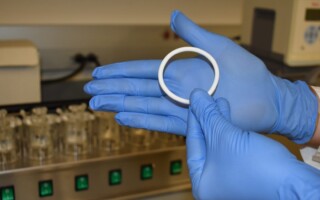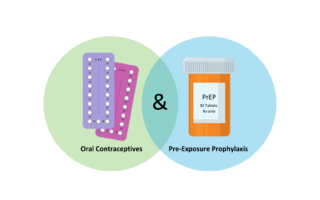
There is a significant unmet need for multipurpose prevention technology (MPT) products that protect women against HIV and/or unintended pregnancy. Although several MPTs are in development, the current pipeline is dominated by antiretroviral (ARV) products with progestin-only contraception using levonorgestrel. To expand the HIV prevention landscape, more easy-to-use, non-ARV, self-administered products are urgently needed.
The Population Council, in collaboration with Oak Crest Institute of Science, is developing a three-month, pod-type intravaginal ring containing the progestin etonogestrel (ETG), the estrogen ethinyl estradiol (EE), and the anti-HIV lectin QGriffithsin (QGRFT)—the EEQ IVR—to prevent unintended pregnancy and HIV.
The EEQ IVR is currently in the preclinical phase of development. In conjunction with the EEQ IVR development work, a three-month pilot crossover clinical study is currently underway with 24 US couples. The study compares adherence, preference, and acceptability of three non-medicated silicone intravaginal rings (IVRs).
These IVRs, each used for 30 days, have the same cross-sectional diameter but different outer diameters. The outcomes of this trial will inform the size of the EEQ IVR. This trial is being performed with the Albert Einstein College of Medicine and Emory University.
The EEQ IVR offers significant advantages over ARV and progestin-only contraceptive products. It could reduce both the emergence of drug-resistant HIV and common irregular bleeding complaints associated with use of progestin-only contraceptives.
The EEQ IVR would be the first non-ARV MPT for women at high risk for both unintended pregnancy and HIV acquisition. The EEQ IVR has the potential to advance the MPT and drug delivery fields. In addition, the clinical study results may both inform the final size of the EEQ IVR and influence the size of future vaginal rings to be developed.




